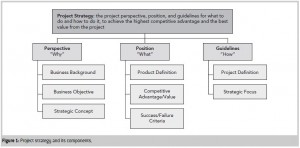One of the skills that every corporate executive could have is project management, but SURELY every project manager should master the art of strategy.
As our project management class unfolds, I became more convinced that we cannot design or execute projects without the proper alignment of our objectives and resources as Project Managers with our corporate strategy. After all, projects are initiated to achieve business results. Projects should then not only be managed from the operational aspect but from the business aspect as well. Getting the job done does not seem enough anymore, rather getting the Right job done is what is needed. This mindset does not come to cancel the existing ways of doing projects but to expand the projects meaning and give them a broader reason.
To help build the Project strategy one has to identify to following projects components:
- Perspective “Why”: Defines the reason and the motivation for the project, as well the need, environment and business opportunity. This will help understand the big picture and creates motivation among the staff.
- Position “What”: Defines the end product of the project which will be delivered to the customer or users. How could this project contributes to our product, and why the customer will buy our product and why our product is better than what is available on the market
- Plan “How”: This part of the project strategy explains how the objectives and competitive advantage are going to be achieved. At this level statement of work (SOW) and work break down structure (WBS), Project Matrix are developed. Shall a company want to be a first-mover, “time” will then have to be a constraint and delays cannot be accepted. On the other side if a company has the objective of being a cost leader, PM working on product design teams have to ensure that “cost” is a constraint as failing to be a cost leader might put the company’s competitive advantage under threat.
In the recent increase of project based companies, this skill has become inevitable for PM. Projects objectives seem to be giving a project its short term meaning, but its alignment with the strategy extends that meaning to a longer term.
Avoiding this truth can only lead the project to failing to add real value and build a sustainable business model.
Recently i have been involved in several retail store construction projects where it was clarified to us since the early stages of the works that time is our constraint. Opening according to the set deadlines was crucial for our company not only to meet its commitments with the landlord and franchisor but also to remain ahead or aligned with the competition.
Do you agree that projects managers should dispose of great strategic skills? Do you have any project, according to your opinion, being executed without being relevant to the company strategy?
Patanakul, P., & Shenhar, A. J. (2012). What project strategy really is: The fundamental building block in strategic project management. Project Management Journal, 43(1), 4-20. doi:10.1002/pmj.20282
